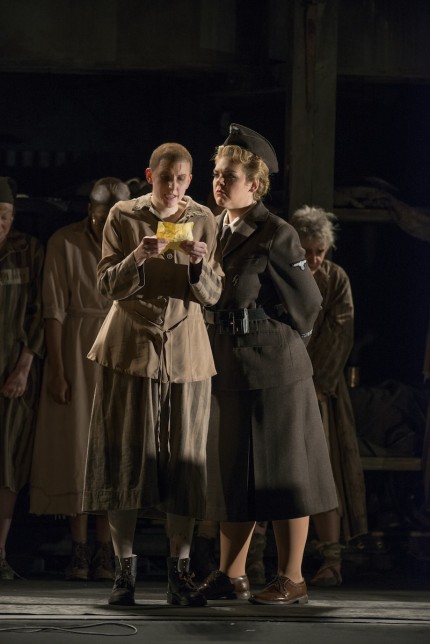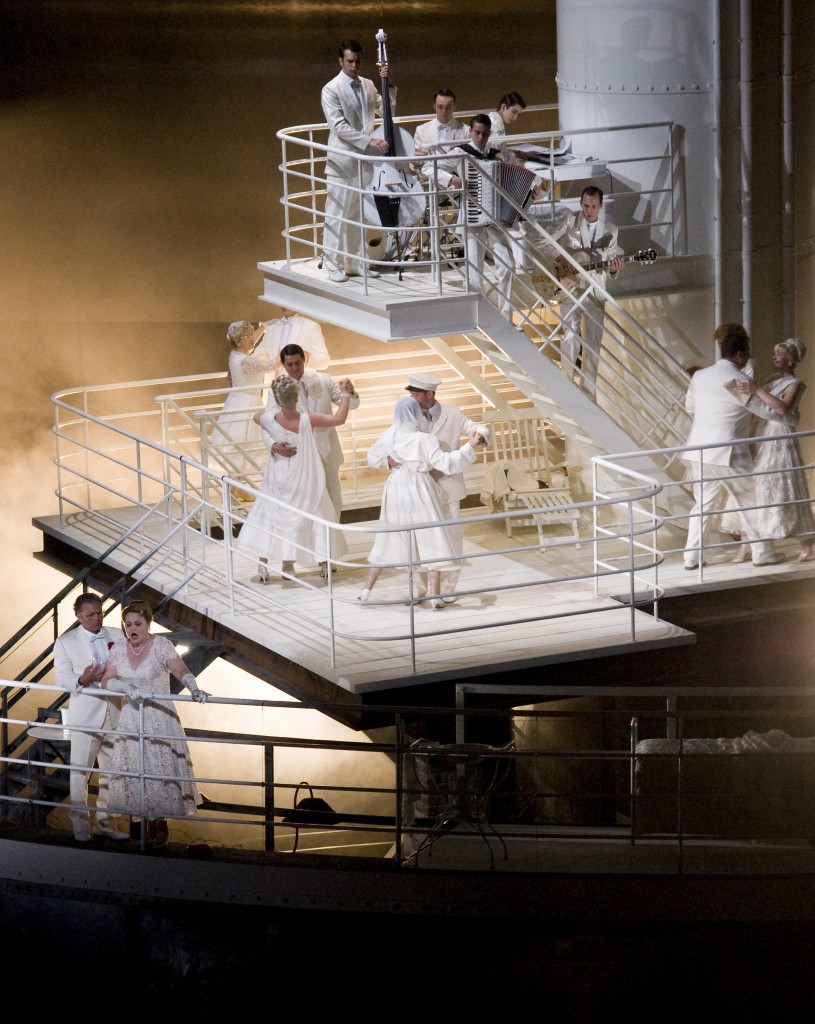FGO to present powerful Holocaust drama “The Passenger”

Daveda Karanas (right) as Liese and Amanda Majeski as Marta in “The Passenger” at Lyric Opera of Chicago. Photo: Michael Brosilow
Any ambitious singer would normally jump at the chance for a major role at a leading opera house.
But when the American mezzo-soprano Daveda Karanas was offered a part in The Passenger by Lyric Opera of Chicago, she hesitated. She brooded, she agonized. She wrestled with the decision for two weeks.
The role: An SS officer at Auschwitz.
Karanas overcame her doubts and sang the role of Liese to acclaim in Chicago. She will sing the villainess role again at Florida Grand Opera’s performances of The Passenger, which opens April 2.
The production of this work by Polish composer Mieczysław Weinberg is a major event for Florida Grand Opera. Known primarily for performances of the classics of Mozart, Rossini, and Puccini, the company is participating in the revival of a work suppressed by Soviet authorities that reaches into one of the darkest episodes in human history. For FGO, whose financial position has been shaky in recent years, The Passenger represents a big risk, staging a grim work by a little-known composer that is unlikely to leave anyone whistling much of anything on their way out.
But the opera has drawn praise from critics in New York, Chicago and other cities, both for the dramatic punch of its plot and for a dark musical score shadowed by the spirit of Weinberg’s friend Dmitri Shostakovich. And it is performed on an enormous double-decker set that many believe has itself accounted for much of the revival’s success.
Based on a novel by Auschwitz survivor Zofia Posmysz, The Passenger takes place in the late 1950s aboard an ocean liner on its way to Brazil, where Liese’s husband, a West German diplomat, is about to take up a new post. He knows nothing of her past as an SS officer. During the voyage, Liese thinks she recognizes a woman named Marta, who had been an inmate at Auschwitz. Through flashbacks, the opera shows the brutal regime of the concentration camp, where Liese is the stern overseer and Marta and the other women are struggling to survive and retain their humanity.
“It’s set at the time of the Holocaust, but it’s really about two women,” said Susan Danis, FGO’s chief executive officer and general director. “It’s about the loss of humanity, and it’s about watching this woman who can’t come to grips with what she does and watching her disintegrate. And that’s a human experience, and that’s really the journey that we want people to take.”
To prepare for the role of the SS officer, Karanas traveled to southern Poland. Entering Auschwitz, where the infamous “Arbeit macht Frei” (Work Makes One Free) sign remains over one gate, she spent two days touring the camp complex. On her second day, she entered the section of the camp known as Birkenau, site of the gas chambers, the infamous arched brick railroad entrance and the women’s barracks in which part of the opera is set.
Karanas walked through the barracks, which she described as unheated horse barns. She saw the train cars that delivered fresh victims. At the research center, she read interviews with survivors. She saw family photos taken from the plundered luggage of the inmates, who had innocently followed instructions to bring their belongings for what they had been told would be their new lives.
“It was very eerie,” she said. “It can’t be described, and it’s something that will live with me for the rest of my life. It made it a lot more real, as opposed to a character on a page.”
Female guards and officers routinely worked in the women’s sections. At the 1947 Auschwitz trial held by Polish authorities, five women were convicted of crimes against humanity. Three received prison sentences. Two, including Maria Mandl, SS commander of the women’s camp, were hanged. Mandl achieved lasting notoriety as one of the devils of Auschwitz, earning the name The Beast for the pleasure she took in tormenting prisoners and selecting the ones for the gas chamber.
Such a selection scene takes place in The Passenger, and for Karanas, it is one of the most difficult things she has ever had to do on stage.
“For me as an artist, one of the hardest moments is toward the end of the opera is we start reading off names of women,” she said. “This line of women starting to go out to have whoever picked out of the lineup to go to death. For me, it’s so hard. I have to go out there, and I have to look at the capo and nod to say go ahead. And I have to look out at the audience, and I have to be a steely, strong, dominant character, and inside I’m just keep it together.”
And yet, despite the monumental crimes in which her character participated, she said there’s a humanity to Liese that she had to bring out on stage. “She grew up during the regime of Hitler,” she said. “She was taught this is how you are as a German. This is what you’re to do. And in the opera, when you go back to Auschwitz and you see her, she had this innocence about her. She wants to please her overseers, she wants to do the job correctly so she’ll get these accolades.
“It’s very easy to play a villain and play it one-sided, as just a character. But these are real humans.”
Weinberg, whose parents and sister were killed in the Trawniki concentration camp, fled to the Soviet Union in 1939. He became friends with Shostakovich, who used what influence he had to protect Weinberg, a vulnerable foreign Jew in a country where anti-Semitism remained strong. When Weinberg was imprisoned, Shostakovich intervened to get him out.
But if the influence of Shostakovich could spring Weinberg from prison, it could not make Soviet authorities love The Passenger. The opera’s dark themes found little favor with a musical establishment that preferred uplifting, outward-looking works that celebrated working-class or communist heroes; a focus on the Holocaust deflected attention from the favored theme of Soviet sacrifices during “The Great Patriotic War.” Weinberg, who completed the opera in 1968, died in 1996 without ever seeing it performed.
The opera received its first fully staged performance in 2010 at the Bregenz Festival in Austria in a production by the English director David Pountney. This same production, which will be seen on the Arsht Center stage, came to the United States for performances in Houston, Chicago, Detroit and New York. After the Miami performances, it will return to Europe.
While the staging has been universally acclaimed, critical reaction to the opera itself has been mixed. The Detroit Free Press praised the “stark and chilling beauty of Weinberg’s music” and said the impact was “devastating.” Chicago Classical Review found the first scene slow and talky but said that once the scene shifted to Auschwitz “the drama and the music take off,” with the scenes of women at the camp trying to help each other offering “the most moving and powerful moments of the entire work.”
As for the music, the CCR critic called The Passenger score “uneven and even derivative, showing a strong influence of Shostakovich and Benjamin Britten,” though more impressive in the quiet moments. “The various solo soliloquies by the women prisoners are often supported with just a spare obbligato violin or wind line, creating a fragile, searching lyricism that is dramatically apt and moving.” The New York Times wrote, “The most powerful scenes in the camp are those in which Weinberg writes music of eerie, haunting restraint. And, in Marta, he has created a formidable operatic heroine.”
A major element in the success of the revival is the huge rotating set, which will be used in the FGO performances. Designed by the late Johan Engels, it consists of an upper tier that shows the elegant life aboard the ocean liner and a lower one that shows gray, grim Auschwitz, sinister with its train tracks and barracks. It is here, in the misery of the camp, that Marta, sung by the soprano Adrienn Miksch, and some of the other prisoners cope with the hardships with courage, concern for each other and a commitment to maintaining their decency as human beings.
“One of the themes running through this opera is the need by all of the humans who have had their humanity removed, who have been dehumanized by the system, trying to reach out and connect with one another,” said Philip Pierce, FGO’s director of artistic administration.
“There’s an incredibly powerful scene between an old Russian woman Bronka and the 15-year-old French girl, and they are each reminded of a granddaughter and grandmother and feel this incredible need to start communicating. There’s a remarkable scene in French and Russian where the two of them are speaking their own language but are learning to communicate with one another. And this is that much more emotionally powerful for us to be aurally witnessing this communication disconnect, this emotional bond that is being created in spite of the obstacles.”
An important decision taken by FGO was whether to do the opera in English or in the characters’ native languages. Although English may have made it easier to sell tickets, Danis said the multilingual version performed elsewhere would be truer to the spirit of the opera. As a result, the production will be heard, as the Pountney production was conceived, in the characters’ own languages: German, Russian, Polish, English, French, Czech and Yiddish.
“I feel that we have a sophisticated enough audience to deal with the polylingual version, and with the complexity of the music and the vocal parts,” said Danis. “I’m not sure anyone would have understood the English anyway. They would have been hanging on the surtitles just as they will be for this one.”
But as in almost every opera, the music is the most important element. “The power of the music is in how evocative it is,” said Pierce. “The overture, with those incredibly strong timpanis that aren’t quite regular, really evoke something that is dreaded but you don’t know what that is yet. In the same way, when we hear the waltz in the second act that becomes a recurring theme, nothing about it is quite right. The rhythm is correct, but there’s something that feels ever so slightly off.
“All of the music has that quality of an old postcard. You’re seeing it through a veil. It’s somebody’s memories.”
The Passenger runs April 2-9 at the Arsht Center in Miami. fgo.org; 800-741-1010.
Posted in Articles
Leave a Comment
Wed Mar 23, 2016
at 7:00 pm
No Comments







